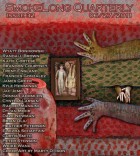Did God really tell Sammy Krupnik somebody was going to drown at Bible Camp that summer?
What an awful thing for God to do to the poor kid! I guess it depends on how you read the relationship between the first two sentences of the story. Is the second sentence meant to announce, in words, the revelation signified by the feeling of God’s finger pressing through his chest? Or is it Sammy’s translation of this feeling? In the first case, we would have to see Sammy as some kind of child-prophet burdened with a secret knowledge of an event he will, in vain, try to prevent. And we would have to ask the question: by the end of the story does somebody drown at Bible Camp? (God wouldn’t make a mistake. Does the guy in the film count, even if it’s a staged drowning? Is it possible God is playing on a metaphorical sense of drowning?)
In the second case, we have the situation of a child trying to put an incommunicable feeling into words and then being burdened with an intense anxiety as he tries to deal with what it means to have this feeling and understand it in this way. These two possibilities might also overlap in some ways. The first sentence says it was “as if” God were pressing his finger through Sammy’s chest. Obviously the idea of God’s finger isn’t literal, but maybe the metaphor goes further than this: maybe Sammy’s understanding that God is communicating to him directly is itself a translation of whatever he’s feeling. Why would Sammy translate this feeling into “God is speaking to me” and then “Somebody’s going to drown”? These two sentences raise the question of what God means to Sammy and what drowning means to Sammy and why he would put the two of these things together.
In any case, I wanted the beginning of the story to feel like a thunderbolt, a blast of certainty and dread and anxiety that would carry its way through the story. Sammy thinks he knows something bad is going to happen, but it’s unclear whether he’s mixing up his idea of God with his own fears. When we feel something, do we always know what it means? Can we put it into words? Even if we can, we have to work with our own limited understanding and the limits of language.
Have you ever been to summer camp? If so, what kind and how did your camp experience compare to Sammy’s?
Many of the details in this story are based on a summer camp I went to in North Carolina, two summers in a row, when I was 10 and 11. (I grew up in the South and at the time was living in Florence, South Carolina.) In general my camp experience was more enjoyable than Sammy’s. I loved swimming and riding the BMX racing tracks; I loved camping and waterfalls and learning random things about nature— that chewing pine needles will get you vitamin C and sassafras roots taste like root beer. There was a woman who ran a nature class where we picked huckleberries for a pie and she made us candied roses and sassafras tea. That said, the whitewater rafting film was freaking terrifying. The whitewater rafting itself, on the other hand, was great, probably because there was almost no white water and it was mostly just floating and paddling down the river.
I loved the image of Sammy up on the cross and how you wrote, “Long after he said good-bye to God he still kept that moment.” Can you give some insight into this beautiful little part of the story?
There needed to be something in the story that lifted Sammy out of himself, a moment where he could feel utterly free from himself and his surroundings. I suppose I could talk about the symbolism of the cross and of the contrast between being sunk under the water and being able to climb into the sky, but that seems too easy and to be honest I wasn’t thinking of any of that while writing. In early drafts this moment was explicitly imaginary, but I liked the idea finally of blurring fantasy and reality and suggesting something transgressive and triumphant, however temporary, in Sammy’s act. In the scene immediately prior, he doesn’t take the chewing tobacco, he doesn’t participate in the masculine ritual — he wants his own moment.
This is the only point in the story where it leaps ahead to hint at Sammy’s future. With the way the story ends, it seemed necessary to me to suggest that when everything else that might have been meaningful to him at one point in his life falls away, there is still a moment that lingers, that remains meaningful, outside of any category of meaning it might once have been in.
Maybe what drew me to this piece was Sammy’s worried nature. The way the doom of the drowning prophecy seemed to hang like a dark cloud over everything he did at camp and how it seemed like he was the only boy with concern. How did you come up with Sammy?
I usually begin writing a story with a sentence or a phrase. For this story, I think it was, “Somebody was going to drown this summer at Bible Camp.” It suggested to me a kid who would worry about everything; everything about himself would be insecure and everything that happened to him would be a source of anxiety. Then I started piling the events of the story on top of one another; I wanted this rhythm to the story where the boy wouldn’t be able to rest before being hit with something else. Bible Camp is basically the name for everything he’s afraid of: God, death, sexuality, growing up, being a brother, being a teenager, being a boy. He didn’t have a name until late in the writing, when I decided to give him the name I had been using for a few other stories and fragments I had been working on but hadn’t finished.



 A SmokeLong Summer 24!
A SmokeLong Summer 24!